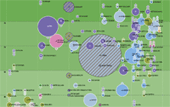GENDER EQUITY: BETTER OR WORSE, DEPENDING ON THE STARTING POINT
|
Published on Mon, 2010-03-08 14:10
PRESS RELEASE New York, March 2010. As shown in the Gender Equity Index (GEI) 2009, launched by Social Watch, on Tuesday 9th March as a contribution to the 54th Session of the UN Commission on the Status of Women on International Women´s Day (8th March 2010), the most inequitable countries and regions in terms of gender, were those which reported less progress compared to 2008. “This stagnation, combined with the progress shown in places where the relative situation was better, enlarged the gap between the most and the least equitable realities”, stressed Social Watch coordinator Roberto Bissio. Social Watch is an international network of citizens’ organizations – in over 60 countries – in the struggle to eradicate poverty and it's causes, to end all forms of discrimination and racism, to ensure an equitable distribution of wealth and the realization of human rights. The GEI, produced annually by Social Watch from international available and comparable information, was designed to make visible gender inequity situations and monitor their development over time. It ranks countries and regions according to their performance in education, economic activity and empowerment - three dimensions closely linked to gender inequality. The GEI 2009 analyses the situation of 156 countries according to the latest available data for these three dimensions. A more detailed study of the data shows that, although globally there were improvements in education and economic activity indicators, the severe decline in empowerment, observed in 15% of the countries, resulted in a overall average drop of a half percentage point - from 35% to 34.5% - about the value of 2008. According to Bissio, “the 2009 edition returns to highlight that a low national income level is a bad excuse for gender inequity.” For instance Rwanda - which, for years, has been among the most equitable countries in the world - moved up from fifth to third in the GEI, displacing Germany and Norway, and being beaten only by Sweden and Finland. Regarding this reality, empowerment is again the most highlighted indicator. In this case because, with the exception of North America, all regions have countries in which empowerment is a very deficient issue. In Europe, for example, there are countries with values well below the average – such as Czech Republic with 53 points. The complete version of the GEI 2009 is available online from: <www.socialwatch.org/node/11561>. » |
SUSCRIBE TO OUR NEWSLETTER



